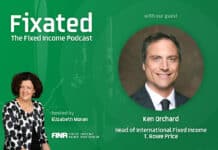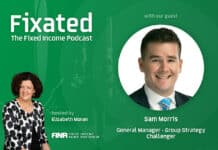
There’s growing consensus that rates have peaked and now is an opportune time
to reassess investment options, prime case in point is Term Deposits (TDs) versus actively managed bond funds.
At the end of November 2023, the Yield to Maturity on the Australian Composite Bond index had surged to 4.53%, compared to the reported Retail Deposit rate for a one-year term of 4.6% – almost line ball, says Western Asset, a global fixed income asset manager and part of the Franklin Templeton group.
Western Asset adds, “Taking the Australian Composite Bond Index, with a duration of approximately 5 years and a yield of around 4.55%, a straightforward calculation illustrates the superior return potential of a core bond portfolio versus TDs as yields decline.
“For every year of duration, a parallel shift lower in the yield curve approximately equates to a 1% increase in capital prices. If yields were to decrease by 1%, a capital uplift of approximately 5% would occur. Similarly, a 0.5% decrease in yields would amount to an approximately 2.5% capital uplift on a 5-year duration portfolio.
Also read: Bond ETF Inflows Set to Continue in 2024
When compared to an actively managed fixed income strategy, Western Asset notes that “A TD has a lower flexibility and liquidity; no upside potential if yields decline; has limited diversification and higher concentration risk; includes investment risk; cannot benefit from active management and poses administrative inefficiency.”
“In sum, the benefits accrued to Term Depositors from the lack of capital movement during a period of steadily rising yields appear to have reached their peak. If economic growth stalls and yields move lower in expectation of rate cuts, fixed income portfolios will benefit whereas TDs will not.
“Seeking to defend margins and maintain profitability, ‘bonus’ rates on cash at call may also be subject to more onerous conditions in future and TD rates may be lower when the time comes to roll them, even if official rates stay constant.
“In that case, investors may be better rewarded investing in an actively managed portfolio of Australian cash and bonds, targeting similar levels of income with potential for capital uplift for the most defensive investors, who have low tolerance for interest rate volatility and drawdowns but wish to add some protection from reinvestment risk, the Western Asset Conservative Income Fund is an option.”
The Western Asset Conservative Income Fund is an actively managed portfolio of short-term fixed income securities for excess cash holdings.
“Launched in 2001, the Fund has a long-term record of outperforming pure cash and TD
alternatives1. Unlike the latter, the fund offers daily liquidity, an advantage for investors with uncertain cash flow requirements and removes the administrative burden of rolling (TD) maturities. Moreover, as yields fall, TD holders’ upside above the promised rate of interest is nil. Whereas the fund stands to benefit from any fall in yields via its small but positive duration exposure.”
1 As of 31 December 2023, past performance is not a guide to future returns.

































